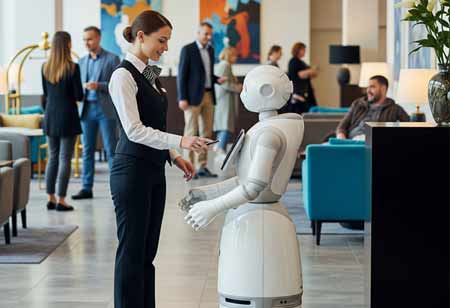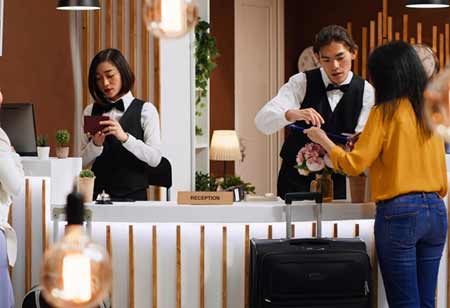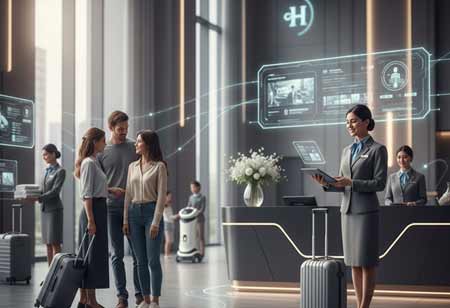Thank you for Subscribing to Hospitality Business Review Weekly Brief
- Home
- Topics
- Automatic Coffee Machines
- Catering and Dining Services
- Hospitality Advisory Services
- Hospitality Construction Services
- Hospitality Consulting Services
- Hospitality Marketing
- Hospitality Procurement
- Hospitality Staffing Services
- Insurance Services
- Travel and Tourism Management
- Vacation Rental Property Management
- Vendor Viewpoint
- News
- CXO Insights
- Conferences
- Newsletter
- Subscribe
- About Us
- CXO Awards
-
Robotics in Hospitality: Enhancing Efficiency Without Losing the Human Touch
European hospitality is integrating robotics to enhance efficiency while preserving personal service, allowing staff to focus on meaningful guest interactions and maintain cultural authenticity.

By
Hospitality Business Review | Friday, October 03, 2025
Stay ahead of the industry with exclusive feature stories on the top companies, expert insights and the latest news delivered straight to your inbox. Subscribe today.
Fremont, CA: The European hospitality sector, renowned for its rich tradition of personalised service and cultural experiences, is increasingly embracing robotics to navigate the demands of the modern era. Far from seeking to replace human interaction, this technological integration aims to enhance operational efficiency, streamline repetitive tasks, and ultimately free up staff to deliver the authentic, high-touch experiences that European hospitality is celebrated for.
The Rise of Robots in European Hotels and Restaurants
Across Europe, from urban hotels to charming rural inns, robots are gradually becoming an integral part of the hospitality landscape. No longer confined to futuristic speculation, these technologies are now practical tools addressing tangible operational needs.
At the front of house, robotic assistants—such as concierge robots like Hilton’s early prototype “Connie” or self-service check-in kiosks—help streamline guest interactions. These solutions handle routine tasks, such as answering frequently asked questions, providing directions, and managing check-in and check-out processes, particularly during peak periods. This not only reduces wait times but also allows human staff to concentrate on delivering more personalised and complex guest services.
Behind the scenes, robotics often makes its most significant impact. Cleaning robots ensure consistent sanitation of public areas and guest rooms, upholding high hygiene standards. In parallel, laundry-folding robots and autonomous delivery units that transport linens, food, and supplies help lighten physical workloads and enhance operational efficiency.
In-room service is also evolving, with autonomous delivery robots providing 24/7 access to amenities, snacks, and meals, thereby enhancing guest convenience and adding a unique technological touch to the stay. In food and beverage operations, while direct robot interaction with guests remains limited compared to other regions, robots are increasingly supporting kitchen staff by performing repetitive tasks. Some are even deployed in buffet settings, although full-scale robotic food preparation remains rare, given Europe’s continued emphasis on culinary craftsmanship.
The Crucial Balance: Maintaining the Human Touch
In the European hospitality sector, the integration of robotics is often met with concern about the potential loss of authentic human connection, a defining hallmark of the industry. However, the prevailing approach across the region is not to replace human staff, but to enhance their roles through strategic technological augmentation.
Robots are being deployed primarily to handle repetitive and time-consuming tasks, such as delivering room service or providing round-the-clock housekeeping support. This allows human staff to focus on creating more meaningful guest experiences—engaging in authentic conversations, providing local insights, and responding to complex or emotionally nuanced requests. By shifting from transactional functions to more relational responsibilities, employees are empowered to foster deeper connections with guests.
Moreover, hotels are investing in training and upskilling programs to prepare staff for this evolving landscape. Employees are being equipped to operate, manage, and collaborate with robotic systems, opening the door to new career paths that require a blend of technical proficiency and traditional hospitality acumen.
Crucially, European hospitality continues to place a premium on empathy, personalisation, and cultural authenticity—qualities that remain uniquely human. While robotics contributes to efficiency, they are not intended to replace the emotional intelligence and intuitive service that define exceptional guest experiences. Instead, a symbiotic model is emerging, where technology supports staff in delivering more attentive, personalised, and memorable service.
Robotics in European hospitality is not a question of "if," but "how." The industry is poised for a transformative period where technology and human ingenuity work in concert. The future of European hospitality will be one where technological innovation serves to amplify, rather than diminish, the indispensable human touch.







